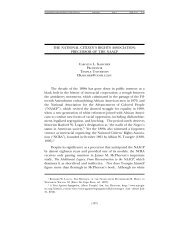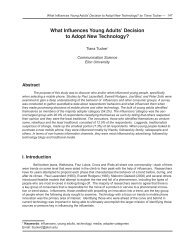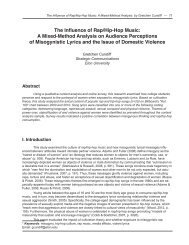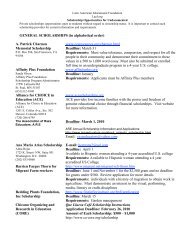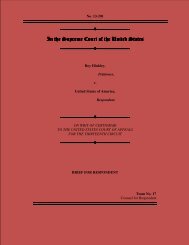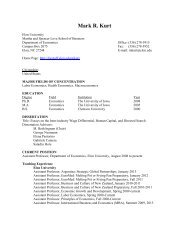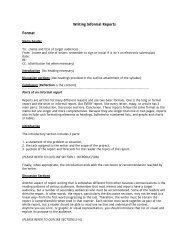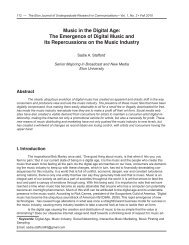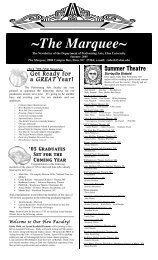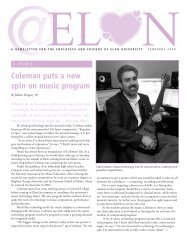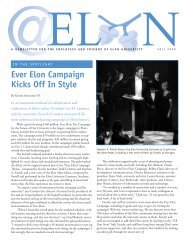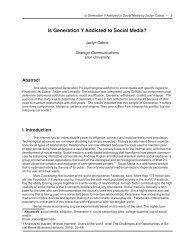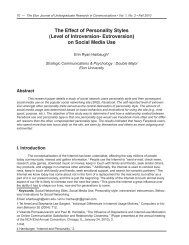Reclaiming Democracy - Elon University
Reclaiming Democracy - Elon University
Reclaiming Democracy - Elon University
You also want an ePaper? Increase the reach of your titles
YUMPU automatically turns print PDFs into web optimized ePapers that Google loves.
Fall 2011<br />
Wednesdays, 6:00 – 9:00 p.m.<br />
<strong>Elon</strong> <strong>University</strong> School of Law<br />
Room 207<br />
www.reclaimingdemocracy.us<br />
Course Instructors<br />
Stephen Bloch-Schulman, Philosophy<br />
PHL 320, <strong>Elon</strong> <strong>University</strong><br />
sschulman@elon.edu<br />
Office: Spence Pavilion, 112<br />
Phone: 336-278-5697<br />
Audrey Campbell, Womanist Religious Studies<br />
TC 473, Bennett College<br />
draecamp@bennett.edu<br />
Office: Africana Women’s Studies Bldg.<br />
Phone: (336) 517-2151<br />
www.reclaimingdemocracy.org 8.22.11<br />
<strong>Reclaiming</strong> <strong>Democracy</strong><br />
Sherry Giles, Community & Justice Studies<br />
JPS 335, Guilford College<br />
gileshc@guilford.edu<br />
Office: King 28E<br />
Phone: 336-316-2285<br />
Fred Humphrey, Liberal Studies<br />
LIBS 320, North Carolina A & T State <strong>University</strong><br />
jfhumphr@ncat.edu<br />
Office: A-311 General Classroom Bldg.<br />
Phone: 336-285-2103<br />
Spoma Jovanovic, Communication Studies<br />
CST 440, UNCG<br />
spomajovanovic@uncg.edu<br />
Office: Ferguson 108<br />
Phone: 336-601-3282<br />
Dan Malotky, Religion & Philosophy<br />
ETH 3500, Greensboro College<br />
dmalotky@greensborocollege.edu<br />
Office: Proctor Hall West 310<br />
Phone: 336-272-7102, ext. 280<br />
Ed Whitfield<br />
Fund For Democratic Communities<br />
ewhitfield.fdc@gmail.com<br />
Office: The Green Bean, 341 Elm Street<br />
Phone: 336-541-4317<br />
Teaching Assistants:<br />
Andy Busam, UNCG, aebusam@uncg.edu;<br />
Maggie Castor, <strong>Elon</strong> <strong>University</strong>, mcastor@elon.edu<br />
We thank the faculty and students who were part of<br />
past teaching teams and continue to influence how<br />
we think about <strong>Reclaiming</strong> <strong>Democracy</strong>: Ellen<br />
Bateman, Gwendolyn Bookman, Eric Ginsburg,<br />
Karla McLucas, Larry Morse, Isabell Moore, and<br />
Wendy Poteat.
Course Description<br />
<strong>Reclaiming</strong> <strong>Democracy</strong> draws on multiple academic<br />
disciplines to examine and model democracy. The<br />
course brings together students from Bennett<br />
College, <strong>Elon</strong> <strong>University</strong>, Greensboro College,<br />
Guilford College, North Carolina A & T State<br />
<strong>University</strong>, the <strong>University</strong> of North Carolina,<br />
Greensboro and the greater Greensboro community.<br />
To understand what we mean by “democracy,” we<br />
explore the different traditions that drive public<br />
policy, governance, and citizen engagement. As we<br />
turn our gaze toward democracy in Greensboro<br />
more specifically, we consider the city’s rich history<br />
in civil rights and economic justice, as well as the<br />
even more powerful desire for civility that has<br />
impacted our ability to have deep, community-wide<br />
discussion of the area’s struggles.<br />
Participants in the class learn together within a large<br />
classroom and also in smaller study groups. We use<br />
interactive technology to stimulate pre-class<br />
questions and discussions for that week’s readings.<br />
To set the tone for communal engagement, we<br />
augment traditional academic learning with other<br />
experiences within music, stories, film, and<br />
creativity of other sorts.<br />
Course Readings<br />
Chafe, W. (1980) Civilities & Civil Rights<br />
Articles as assigned<br />
Course Questions<br />
• What is democracy?<br />
• In what ways is Greensboro<br />
democratic/undemocratic?<br />
• What is the role of education in a democratic<br />
society?<br />
• What is the role of democracy in education?<br />
• What do these considerations require of us?<br />
www.reclaimingdemocracy.org 8.22.11<br />
<strong>Reclaiming</strong> <strong>Democracy</strong><br />
Course Goals<br />
• Develop an understanding of democracy that<br />
is responsible to all members of the<br />
community.<br />
• Critically examine the theories and concepts<br />
that inform our contemporary and historical<br />
understandings of democracy.<br />
• Explore the role of stories and public<br />
narratives in democracy.<br />
• Identify barriers to democracy at personal,<br />
systemic, institutional, and cultural levels.<br />
• Co-create a model of teaching and learning<br />
that embraces democracy.<br />
• Create a vibrant and productive dialogue<br />
about community issues.<br />
• Study the discourses, decision making and<br />
community action relevant to key<br />
community issues.<br />
• Develop and deepen an understanding of<br />
what democracy requires of us.<br />
• Explore the ways a person’s social identity<br />
impacts his or her relationship to the issues<br />
and concepts we are studying in class.<br />
Course Grading<br />
Please hand in two copies of each written<br />
assignment. All faculty abide by a common grading<br />
rubric. Students wishing to contest any grade will<br />
follow a process that includes providing a written<br />
argument with ample evidence to persuade a team<br />
of not less than two faculty members why a grade<br />
should be modified. The instructor of record (the<br />
one affiliated with the student’s home institution)<br />
will be the final arbiter.<br />
Grading Scale<br />
A—90 –100<br />
B—80 – 89<br />
C—70—79<br />
D—60 – 69<br />
F—below 60
Course Assignments—Details for each of these is<br />
provided on the separate assignment sheet for the<br />
class.<br />
Your Education Ethnography—A reflection on<br />
your educational experience up to this point in your<br />
life. 10 points<br />
Weekly blog entries on course readings and class<br />
discussions to be maintained in a course portfolio.<br />
Self-assessment of your blogs and responses to<br />
them. 15 points<br />
Final blog evaluation 15 points<br />
Participation—Since a democracy is dependent<br />
upon citizen involvement, we expect you to<br />
participate in every weekly class. We also recognize<br />
some absences are unavoidable due to illness,<br />
family emergency, etc. In those cases, contact your<br />
course instructor in advance. 10 points<br />
Civic Discourse Research Paper--To see our<br />
democracy in action, you will view elected and/or<br />
appointed public officials as they deliberate about<br />
local concerns. 10 points<br />
Community Project--In collaboration with your<br />
small group, you will develop a final project that<br />
answers the course questions and satisfies the<br />
course goals as stated in the syllabus. There will be<br />
three short assignments leading to the final project:<br />
Stakeholder Assignment, Power Analysis, and Final<br />
Project Draft 30 points<br />
Final Reflections—Your vision of what you<br />
believe education ought to be in the 21 st century,<br />
considering the influence of and impact on<br />
democracy. 10 points<br />
Late Assignments—Late assignments may not be<br />
accepted. If accepted, all late assignments will<br />
receive point reductions.<br />
www.reclaimingdemocracy.org 8.22.11<br />
<strong>Reclaiming</strong> <strong>Democracy</strong><br />
Course Policies and Expectations<br />
1. Do not expect this course to be easy. The<br />
readings and the discussions are designed to<br />
challenge you. To be prepared, you need to<br />
read the required text and/or articles in<br />
advance of each week’s discussion.<br />
2. Attendance is necessary to ensure rich<br />
discussion in small groups and in the larger<br />
class. We value the learning that occurs<br />
from interaction, and recognize that<br />
democracy itself depends upon collective<br />
engagement. Any time you are absent, you<br />
will need to stay up with the readings in<br />
order to keep up with the class.<br />
3. Ask questions and be curious. Faculty are<br />
available during office hours to address<br />
specific questions and concerns.<br />
4. Watch for emails and updates.<br />
5. BE ON TIME. We will be taking breaks<br />
during the evening, but we expect to start<br />
and finish on time. Also, PLAN TO STAY<br />
until the end of each session out of courtesy<br />
to your colleagues.<br />
6. We will accommodate fall break schedules.<br />
7. We ask that everyone leave laptops closed<br />
and cell phones off during class and as these<br />
devices have a way of separating people<br />
from one another.<br />
8. We encourage the kind of active reading that<br />
includes circling things, highlighting main<br />
points, expressing outrage and agreement in<br />
the text itself, etc. This practice leads to<br />
successful learning.<br />
9. Students are expected to abide by their home<br />
school’s academic integrity policy. See<br />
each school bulletin or web site for details.<br />
Students with Disabilities--If you have any special<br />
needs that require accommodation, please alert your<br />
instructor of record the first week of the semester.<br />
A plan will be developed to meet your learning<br />
needs. If you have a disability, you will need to<br />
provide the proper documentation as required by<br />
your school.
Course Schedule<br />
August 31 All School Introductions<br />
Required Readings:<br />
Jean Anyon article<br />
Paulo Freire chapter 2<br />
Lisa Delpit excerpt<br />
Suggested Readings:<br />
Freire, chapter 1<br />
Due: Education Ethnography<br />
September 7 Theories & Models of <strong>Democracy</strong><br />
Required Reading:<br />
Cornel West chapters 1 & 2<br />
Suggested Readings:<br />
Galtung chapter, Iris Marion Young<br />
chapters 1 & 2<br />
September 14 Theories & Models of <strong>Democracy</strong><br />
Required Readings:<br />
Westheimer & Kahne article<br />
Read Stout, Chapter 18<br />
Sept. 21 Theories of Change & Organizing<br />
Required Reading:<br />
Gene Sharp excerpt<br />
Read Warren chapter<br />
Suggested Readings:<br />
Core Dilemmas of Organizing (from<br />
web-site)<br />
Due: 1 st Civic Discourse Research<br />
Sept. 28 Civilities & Civil Rights, Introduction<br />
Required Reading:<br />
Chafe to p. 70<br />
Due: Blog Self-Assessment<br />
October 5 Greensboro’s Past & Present<br />
Intl. Civil Rights Museum Tour (?)<br />
Required Reading:<br />
Chafe to p. 130<br />
Due: Stakeholder Analysis (Part one of<br />
Final Project)<br />
Due: 2 nd Civic Discourse Research<br />
www.reclaimingdemocracy.org 8.22.11<br />
<strong>Reclaiming</strong> <strong>Democracy</strong><br />
October 12 Greensboro’s Struggles Continue<br />
Required Reading:<br />
Chafe to p. 180<br />
Greensboro Massacre Presentation<br />
Guest Speakers: Nelson & Joyce<br />
Johnson (tentative)<br />
Due: Power Analysis (Part two of final<br />
project)<br />
October 19 Resistance & Action<br />
Required Reading:<br />
Chafe to p. 202<br />
(Note: Guilford College on Fall Break)<br />
Due: 3 rd Civic Discourse Research<br />
October 26 Education in Greensboro<br />
Readings: TBA<br />
Guest speakers: Parents Supporting<br />
Parents (tentative)<br />
Due: Final Project Draft (Part three<br />
of final project)<br />
November 2 Education: Local, National, Internat’l.<br />
Readings: TBA<br />
Due: 4 th Civic Discourse Research<br />
November 9 To Solutions: Organizing for Change<br />
Readings: TBA<br />
November 16 An Alternative Vision ; Democ. Theory<br />
Readings: TBA<br />
Due: 5 th Civic Discourse Research<br />
November 23 No class, Thanksgiving Break<br />
November 30 Conference Preparation<br />
Dec. 2 & 3 Conference at A & T<br />
Community Projects Due<br />
Note: Students will receive communication from their<br />
home instructor regarding additional class meetings<br />
before August 31 and/or after December 3.



